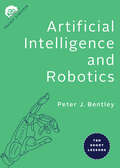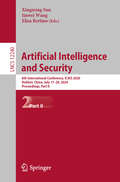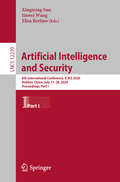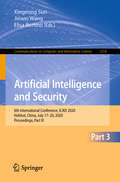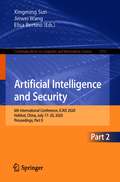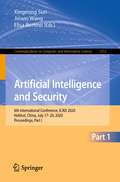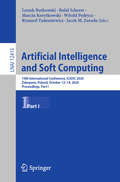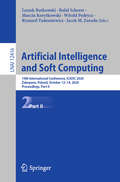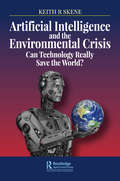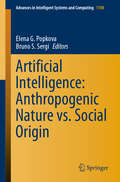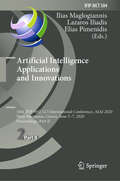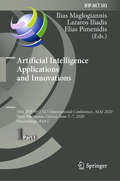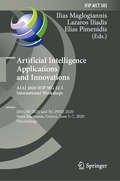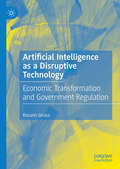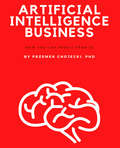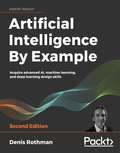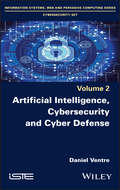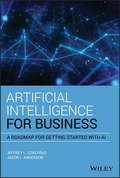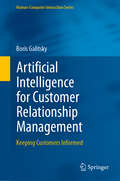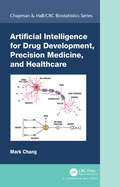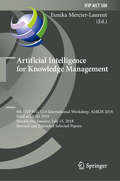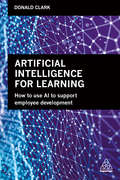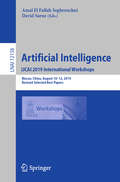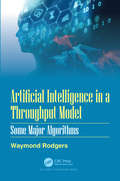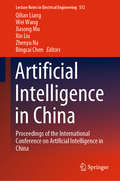- Table View
- List View
Artificial Intelligence and Robotics: Ten Short Lessons (Pocket Einstein Series)
by Peter J. BentleyAn expert introduction to the fascinating world of robotics, artificial intelligence, and how machines learn.In Artificial Intelligence and Robotics: Ten Short Lessons, leading expert Peter J. Bentley breaks down the fast-moving world of computers into ten pivotal lessons, presenting the reader with the essential information they need to get to understand our most powerful technology and its remarkable implications for our species.From the origins and motivation behind the birth of AI and robotics to using smart algorithms that allow us to build good robots, from the technologies that enable computers to understand a huge range of sensory information, including language and communication, to the challenges of emotional intelligence, unpredictable environments, and imagination in artificial intelligence, this is a cutting-edge, expert-led guide for curious minds. Packed full of easy-to-understand diagrams, pictures, and fact boxes, these ten lessons cover all the basics, as well as the latest understanding and developments, to enlighten the nonscientist.About the series: The Pocket Einstein series is a collection of essential pocket-sized guides for anyone looking to understand a little more about some of the most important and fascinating areas of science in the twenty-first century. Broken down into ten simple lessons and written by leading experts in their field, the books reveal the ten most important takeaways from those areas of science you've always wanted to know more about.
Artificial Intelligence and Security: 6th International Conference, ICAIS 2020, Hohhot, China, July 17–20, 2020, Proceedings, Part II (Lecture Notes in Computer Science #12240)
by Xingming Sun Jinwei Wang Elisa BertinoThis two-volume set LNCS 12239-12240 constitutes the refereed proceedings of the 6th International Conference on Artificial Intelligence and Security, ICAIS 2020, which was held in Hohhot, China, in July 2020. The conference was formerly called “International Conference on Cloud Computing and Security” with the acronym ICCCS. The total of 142 full papers presented in this two-volume proceedings was carefully reviewed and selected from 1064 submissions. The papers were organized in topical sections as follows: Part I: Artificial intelligence and internet of things. Part II: Internet of things, information security, big data and cloud computing, and information processing.
Artificial Intelligence and Security: 6th International Conference, ICAIS 2020, Hohhot, China, July 17–20, 2020, Proceedings, Part I (Lecture Notes in Computer Science #12239)
by Xingming Sun Jinwei Wang Elisa BertinoThis two-volume set LNCS 12239-12240 constitutes the refereed proceedings of the 6th International Conference on Artificial Intelligence and Security, ICAIS 2020, which was held in Hohhot, China, in July 2020. The conference was formerly called “International Conference on Cloud Computing and Security” with the acronym ICCCS. The total of 142 full papers presented in this two-volume proceedings was carefully reviewed and selected from 1064 submissions. The papers were organized in topical sections as follows: Part I: Artificial intelligence and internet of things. Part II: Internet of things, information security, big data and cloud computing, and information processing.
Artificial Intelligence and Security: 6th International Conference, ICAIS 2020, Hohhot, China, July 17–20, 2020, Proceedings, Part III (Communications in Computer and Information Science #1254)
by Xingming Sun Jinwei Wang Elisa BertinoThe 3-volume set CCIS 1252 until CCIS 1254 constitutes the refereed proceedings of the 6th International Conference on Artificial Intelligence and Security, ICAIS 2020, which was held in Hohhot, China, in July 2020. The conference was formerly called “International Conference on Cloud Computing and Security” with the acronym ICCCS. The total of 178 full papers and 8 short papers presented in this 3-volume proceedings was carefully reviewed and selected from 1064 submissions. The papers were organized in topical sections as follows: Part I: artificial intelligence; Part II: artificial intelligence; Internet of things; information security; Part III: information security; big data and cloud computing; information processing.
Artificial Intelligence and Security: 6th International Conference, ICAIS 2020, Hohhot, China, July 17–20, 2020, Proceedings, Part II (Communications in Computer and Information Science #1253)
by Elisa Bertino Xingming Sun Jinwei WangThe 3-volume set CCIS 1252 until CCIS 1254 constitutes the refereed proceedings of the 6th International Conference on Artificial Intelligence and Security, ICAIS 2020, which was held in Hohhot, China, in July 2020. The conference was formerly called “International Conference on Cloud Computing and Security” with the acronym ICCCS. The total of 178 full papers and 8 short papers presented in this 3-volume proceedings was carefully reviewed and selected from 1064 submissions. The papers were organized in topical sections as follows: Part I: artificial intelligence; Part II: artificial intelligence; Internet of things; information security; Part III: information security; big data and cloud computing; information processing.
Artificial Intelligence and Security: 6th International Conference, ICAIS 2020, Hohhot, China, July 17–20, 2020, Proceedings, Part I (Communications in Computer and Information Science #1252)
by Elisa Bertino Xingming Sun Jinwei WangThe 3-volume set CCIS 1252 until CCIS 1254 constitutes the refereed proceedings of the 6th International Conference on Artificial Intelligence and Security, ICAIS 2020, which was held in Hohhot, China, in July 2020. The conference was formerly called “International Conference on Cloud Computing and Security” with the acronym ICCCS. The total of 178 full papers and 8 short papers presented in this 3-volume proceedings was carefully reviewed and selected from 1064 submissions. The papers were organized in topical sections as follows: Part I: artificial intelligence; Part II: artificial intelligence; Internet of things; information security; Part III: information security; big data and cloud computing; information processing.
Artificial Intelligence and Soft Computing: 19th International Conference, ICAISC 2020, Zakopane, Poland, October 12-14, 2020, Proceedings, Part I (Lecture Notes in Computer Science #12415)
by Leszek Rutkowski Rafał Scherer Marcin Korytkowski Witold Pedrycz Ryszard Tadeusiewicz Jacek M. ZuradaThe two-volume set LNCS 12415 and 12416 constitutes the refereed proceedings of of the 19th International Conference on Artificial Intelligence and Soft Computing, ICAISC 2020, held in Zakopane, Poland*, in October 2020.The 112 revised full papers presented were carefully reviewed and selected from 265 submissions. The papers included in the first volume are organized in the following six parts: neural networks and their applications; fuzzy systems and their applications; evolutionary algorithms and their applications; pattern classification; bioinformatics, biometrics and medical applications; artificial intelligence in modeling and simulation.The papers included in the second volume are organized in the following four parts: computer vision, image and speech analysis; data mining; various problems of artificial intelligence; agent systems, robotics and control.*The conference was held virtually due to the COVID-19 pandemic.
Artificial Intelligence and Soft Computing: 19th International Conference, ICAISC 2020, Zakopane, Poland, October 12-14, 2020, Proceedings, Part II (Lecture Notes in Computer Science #12416)
by Leszek Rutkowski Rafał Scherer Marcin Korytkowski Witold Pedrycz Ryszard Tadeusiewicz Jacek M. ZuradaThe two-volume set LNCS 12415 and 12416 constitutes the refereed proceedings of of the 19th International Conference on Artificial Intelligence and Soft Computing, ICAISC 2020, held in Zakopane, Poland*, in October 2020.The 112 revised full papers presented were carefully reviewed and selected from 265 submissions. The papers included in the first volume are organized in the following six parts: neural networks and their applications; fuzzy systems and their applications; evolutionary algorithms and their applications; pattern classification; bioinformatics, biometrics and medical applications; artificial intelligence in modeling and simulation.The papers included in the second volume are organized in the following four parts: computer vision, image and speech analysis; data mining; various problems of artificial intelligence; agent systems, robotics and control.*The conference was held virtually due to the COVID-19 pandemic.
Artificial Intelligence and the Environmental Crisis: Can Technology Really Save the World?
by Keith Ronald SkeneA radical and challenging book which argues that artificial intelligence needs a completely different set of foundations, based on ecological intelligence rather than human intelligence, if it is to deliver on the promise of a better world. This can usher in the greatest transformation in human history, an age of re-integration. Our very existence is dependent upon our context within the Earth System, and so, surely, artificial intelligence must also be grounded within this context, embracing emergence, interconnectedness and real-time feedback. We discover many positive outcomes across the societal, economic and environmental arenas and discuss how this transformation can be delivered. Key Features: Identifies a key weakness in current AI thinking, that threatens any hope of a better world. Highlights the importance of realizing that systems theory is an essential foundation for any technology that hopes to positively transform our world. Emphasizes the need for a radical new approach to AI, based on ecological systems. Explains why ecosystem intelligence, not human intelligence, offers the best framework for AI. Examines how this new approach will impact on the three arenas of society, environment and economics, ushering in a new age of re-integration.
Artificial Intelligence: Anthropogenic Nature vs. Social Origin (Advances in Intelligent Systems and Computing #1100)
by Elena G. Popkova Bruno S. SergiThis book presents advanced research studies on the topic of artificial intelligence as a component of social and economic relations and processes. It gathers research papers from the International Research-to-Practice Conference “The 21st Century from the Positions of Modern Science: Intellectual, Digital and Innovative Aspects” (May 23–24, 2019, Nizhny Novgorod, Russia) and the International Research-to-Practice Conference “Economics of Pleasure: a Science of Enjoying Economic Activities” (October 3–5, 2019, Prague, Czech Republic). Both conferences were organized by the Autonomous Non-Profit Organization “Institute of Scientific Communications” (Volgograd). What sets this book apart from other publications on the topic of artificial intelligence is that it approaches AI not as a technological tool, but as an economic entity. Bringing together papers by representatives of various fields of social and human knowledge, it systematically reflects on various economic, social, and legal aspects of the creation, application, and development of artificial intelligence. Given the multidisciplinary nature of its content, the book will appeal to a broad target audience, including those engaged in developing AI (scientific research institutes and universities), and Industry 4.0 enterprises interested in its implementation, as well as state regulators for the digital economy.
Artificial Intelligence Applications and Innovations: 16th IFIP WG 12.5 International Conference, AIAI 2020, Neos Marmaras, Greece, June 5–7, 2020, Proceedings, Part II (IFIP Advances in Information and Communication Technology #584)
by Ilias Maglogiannis Lazaros Iliadis Elias PimenidisThis 2 volume-set of IFIP AICT 583 and 584 constitutes the refereed proceedings of the 16th IFIP WG 12.5 International Conference on Artificial Intelligence Applications and Innovations, AIAI 2020, held in Neos Marmaras, Greece, in June 2020.*The 70 full papers and 5 short papers presented were carefully reviewed and selected from 149 submissions. They cover a broad range of topics related to technical, legal, and ethical aspects of artificial intelligence systems and their applications and are organized in the following sections:Part I: classification; clustering - unsupervised learning -analytics; image processing; learning algorithms; neural network modeling; object tracking - object detection systems; ontologies - AI; and sentiment analysis - recommender systems. Part II: AI ethics - law; AI constraints; deep learning - LSTM; fuzzy algebra - fuzzy systems; machine learning; medical - health systems; and natural language.*The conference was held virtually due to the COVID-19 pandemic.
Artificial Intelligence Applications and Innovations: 16th IFIP WG 12.5 International Conference, AIAI 2020, Neos Marmaras, Greece, June 5–7, 2020, Proceedings, Part I (IFIP Advances in Information and Communication Technology #583)
by Ilias Maglogiannis Lazaros Iliadis Elias PimenidisThis 2 volume-set of IFIP AICT 583 and 584 constitutes the refereed proceedings of the 16th IFIP WG 12.5 International Conference on Artificial Intelligence Applications and Innovations, AIAI 2020, held in Neos Marmaras, Greece, in June 2020.*The 70 full papers and 5 short papers presented were carefully reviewed and selected from 149 submissions. They cover a broad range of topics related to technical, legal, and ethical aspects of artificial intelligence systems and their applications and are organized in the following sections:Part I: classification; clustering - unsupervised learning -analytics; image processing; learning algorithms; neural network modeling; object tracking - object detection systems; ontologies - AI; and sentiment analysis - recommender systems. Part II: AI ethics - law; AI constraints; deep learning - LSTM; fuzzy algebra - fuzzy systems; machine learning; medical - health systems; and natural language.*The conference was held virtually due to the COVID-19 pandemic.
Artificial Intelligence Applications and Innovations. AIAI 2020 IFIP WG 12.5 International Workshops: MHDW 2020 and 5G-PINE 2020, Neos Marmaras, Greece, June 5–7, 2020, Proceedings (IFIP Advances in Information and Communication Technology #585)
by Ilias Maglogiannis Lazaros Iliadis Elias PimenidisThis book constitutes the refereed proceedings of two International Workshops held as parallel events of the 16th IFIP WG 12.5 International Conference on Artificial Intelligence Applications and Innovations, AIAI 2020, in Neos Marmaras, Greece, in June 2020: the 9th Mining Humanistic Data Workshop, MHDW 2020, and the 5th Workshop on 5G-Putting Intelligence to the Network Edge, 5G-PINE 2020.* The 6 full papers and 3 short papers presented at MHDW 2020 were carefully reviewed and selected from 16 submissions; out of the 23 papers submitted to 5G-PINE 2020, 11 were accepted as full papers and 1 as a short paper. The MHDW papers focus on topics such as recommendation systems, sentiment analysis, pattern recognition, data mining, and time series. The papers presented at 5G-PINE focus on the latest AI applications in the telecommunication industry and deal with topics such as the Internet of Things, intelligence fusion in 5G networks, and 5G media.*The workshops were held virtually due to the COVID-19 pandemic.
Artificial Intelligence as a Disruptive Technology: Economic Transformation and Government Regulation
by Rosario GirasaArtificial intelligence (AI) is the latest technological evolution which is transforming the global economy and is a major part of the “Fourth Industrial Revolution.” This book covers the meaning, types, subfields and applications of AI, including U.S. governmental policies and regulations, ethical and privacy issues, particularly as they pertain and affect facial recognition programs and the Internet-of Things (IoT). There is a lengthy analysis of bias, AI’s effect on the current and future job market, and how AI precipitated fake news. In addition, the text covers basics of intellectual property rights and how AI will transform their protection. The author then moves on to explore international initiatives from the European Union, China’s New Generation Development Plan, other regional areas, and international conventions. The book concludes with a discussion of super intelligence and the question and applicability of consciousness in machines. The interdisciplinary scope of the text will appeal to any scholars, students and general readers interested in the effects of AI on our society, particularly in the fields of STS, economics, law and politics.
Artificial Intelligence Business: Expert tips and techniques for how to profit from AI
by Przemek ChojeckiThe concise guide to artificial intelligence for business people and commercially oriented data scientists Key Features • Find out how artificial intelligence is shaping the future of businesses • Discover how AI influences the society and its politics and economy • Explore the future of AI and its applications Book Description We're living in revolutionary times. Artificial intelligence is changing how the world operates and it determines how smooth certain processes are. For instance, when you go on a holiday, multiple services allow you to find the most convenient flights and the best hotels, you get personalized suggestions on what you might want to see, and you go to the airport via one of the ride-sharing apps. At each of these steps, AI algorithms are at work for your convenience. This book will guide you through everything, from what AI is to how it influences our economy and society. The book starts with an introduction to artificial intelligence and machine learning, and explains the importance of AI in the modern world. You'll explore how start-ups make key decisions with AI and how AI plays a major role in boosting businesses. Next, you'll find out how media companies use image generation techniques to create engaging content. As you progress, you'll explore how text generation and AI chatbot models simplify our daily lives. Toward the end, you'll understand the importance of AI in the education and healthcare sectors, and realize the risks associated with AI and how we can leverage AI effectively to help us in the future. By the end of this book, you'll have learned how machine learning works and have a solid understanding of the recent business applications of AI. What you will learn • Find out how AI helps in building innovative cultures in enterprises • Understand how AI boosts start-ups • Discover modern AI trends in the field of manufacturing and logistics • Explore the benefits of text and image generation applications • Study popular machine learning trends and their usage • Uncover the uses of AI in politics and society Who this book is for This book is for artificial intelligence enthusiasts or anyone with a business background who wants to learn how AI can scale up businesses.
Artificial Intelligence By Example: Acquire advanced AI, machine learning, and deep learning design skills, 2nd Edition
by Denis RothmanUnderstand the fundamentals and develop your own AI solutions in this updated edition packed with many new examples Key Features AI-based examples to guide you in designing and implementing machine intelligence Build machine intelligence from scratch using artificial intelligence examples Develop machine intelligence from scratch using real artificial intelligence Book Description AI has the potential to replicate humans in every field. Artificial Intelligence By Example, Second Edition serves as a starting point for you to understand how AI is built, with the help of intriguing and exciting examples. This book will make you an adaptive thinker and help you apply concepts to real-world scenarios. Using some of the most interesting AI examples, right from computer programs such as a simple chess engine to cognitive chatbots, you will learn how to tackle the machine you are competing with. You will study some of the most advanced machine learning models, understand how to apply AI to blockchain and Internet of Things (IoT), and develop emotional quotient in chatbots using neural networks such as recurrent neural networks (RNNs) and convolutional neural networks (CNNs). This edition also has new examples for hybrid neural networks, combining reinforcement learning (RL) and deep learning (DL), chained algorithms, combining unsupervised learning with decision trees, random forests, combining DL and genetic algorithms, conversational user interfaces (CUI) for chatbots, neuromorphic computing, and quantum computing. By the end of this book, you will understand the fundamentals of AI and have worked through a number of examples that will help you develop your AI solutions. What you will learn Apply k-nearest neighbors (KNN) to language translations and explore the opportunities in Google Translate Understand chained algorithms combining unsupervised learning withdecision trees Solve the XOR problem with feedforward neural networks (FNN) and buildits architecture to represent a data flow graph Learn about meta learning models withhybrid neural networks Create a chatbot and optimize its emotional intelligence deficiencies withtools such as Small Talk and data logging Building conversational user interfaces (CUI) for chatbots Writing genetic algorithms that optimizedeep learning neural networks Build quantum computing circuits Who this book is for Developers and those interested in AI, who want to understand the fundamentals of Artificial Intelligence and implement them practically. Prior experience with Python programming and statistical knowledge is essential to make the most out of this book.
Artificial Intelligence, Cybersecurity and Cyber Defence
by Daniel VentreThe aim of the book is to analyse and understand the impacts of artificial intelligence in the fields of national security and defense; to identify the political, geopolitical, strategic issues of AI; to analyse its place in conflicts and cyberconflicts, and more generally in the various forms of violence; to explain the appropriation of artificial intelligence by military organizations, but also law enforcement agencies and the police; to discuss the questions that the development of artificial intelligence and its use raise in armies, police, intelligence agencies, at the tactical, operational and strategic levels.
Artificial Intelligence for Business: A Roadmap for Getting Started with AI
by Jason L. Anderson Jeffrey L. CoveyducArtificial Intelligence for Business: A Roadmap for Getting Started with AI will provide the reader with an easy to understand roadmap for how to take an organization through the adoption of AI technology. It will first help with the identification of which business problems and opportunities are right for AI and how to prioritize them to maximize the likelihood of success. Specific methodologies are introduced to help with finding critical training data within an organization and how to fill data gaps if they exist. With data in hand, a scoped prototype can be built to limit risk and provide tangible value to the organization as a whole to justify further investment. Finally, a production level AI system can be developed with best practices to ensure quality with not only the application code, but also the AI models. Finally, with this particular AI adoption journey at an end, the authors will show that there is additional value to be gained by iterating on this AI adoption lifecycle and improving other parts of the organization.
Artificial Intelligence for Customer Relationship Management: Keeping Customers Informed (Human–Computer Interaction Series)
by Boris GalitskyThis research monograph brings AI to the field of Customer Relationship Management (CRM) to make a customer experience with a product or service smart and enjoyable. AI is here to help customers to get a refund for a canceled flight, unfreeze a banking account or get a health test result. Today, CRM has evolved from storing and analyzing customers’ data to predicting and understanding their behavior by putting a CRM system in a customers’ shoes. Hence advanced reasoning with learning from small data, about customers’ attitudes, introspection, reading between the lines of customer communication and explainability need to come into play.Artificial Intelligence for Customer Relationship Management leverages a number of Natural Language Processing (NLP), Machine Learning (ML), simulation and reasoning techniques to enable CRM with intelligence. An effective and robust CRM needs to be able to chat with customers, providing desired information, completing their transactions and resolving their problems. It introduces a systematic means of ascertaining a customers’ frame of mind, their intents and attitudes to determine when to provide a thorough answer, a recommendation, an explanation, a proper argument, timely advice and promotion or compensation. The author employs a spectrum of ML methods, from deterministic to statistical to deep, to predict customer behavior and anticipate possible complaints, assuring customer retention efficiently. Providing a forum for the exchange of ideas in AI, this book provides a concise yet comprehensive coverage of methodologies, tools, issues, applications, and future trends for professionals, managers, and researchers in the CRM field together with AI and IT professionals.
Artificial Intelligence for Drug Development, Precision Medicine, and Healthcare (Chapman & Hall/CRC Biostatistics Series)
by Mark ChangArtificial Intelligence for Drug Development, Precision Medicine, and Healthcare covers exciting developments at the intersection of computer science and statistics. While much of machine-learning is statistics-based, achievements in deep learning for image and language processing rely on computer science&’s use of big data. Aimed at those with a statistical background who want to use their strengths in pursuing AI research, the book: · Covers broad AI topics in drug development, precision medicine, and healthcare. · Elaborates on supervised, unsupervised, reinforcement, and evolutionary learning methods. · Introduces the similarity principle and related AI methods for both big and small data problems. · Offers a balance of statistical and algorithm-based approaches to AI. · Provides examples and real-world applications with hands-on R code. · Suggests the path forward for AI in medicine and artificial general intelligence. As well as covering the history of AI and the innovative ideas, methodologies and software implementation of the field, the book offers a comprehensive review of AI applications in medical sciences. In addition, readers will benefit from hands on exercises, with included R code.
Artificial Intelligence for Knowledge Management: 6th IFIP WG 12.6 International Workshop, AI4KM 2018, Held at IJCAI 2018, Stockholm, Sweden, July 15, 2018, Revised and Extended Selected Papers (IFIP Advances in Information and Communication Technology #588)
by Eunika Mercier-LaurentThis book features a selection of extended papers presented at the 6th IFIP WG 12.6 International Workshop on Artificial Intelligence for Knowledge Management, AI4KM 2018, held in Stockholm, Sweden, in July 2018, in the framework of the International Joint Conference on Artificial Intelligence, IJCAI 2018.The 11 revised and extended papers were carefully reviewed and selected for inclusion in this volume. They present new research and innovative aspects in the field of knowledge management such as machine learning, knowledge models, KM and Web, knowledge capturing and learning, and KM and AI intersections.
Artificial Intelligence for Learning: How to use AI to Support Employee Development
by Donald ClarkArtificial intelligence is creating huge opportunities for workplace learning and employee development. However, it can be difficult for L&D professionals to assess what difference AI can make in their organization and where it is best implemented. Artificial Intelligence for Learning is the practical guide L&D practitioners need to understand what AI is and how to use it to improve all aspects of learning in the workplace. It includes specific guidance on how AI can provide content curation and personalization to improve learner engagement, how it can be implemented to improve the efficiency of evaluation, assessment and reporting and how chatbots can provide learner support to a global workforce.Artificial Intelligence for Learning debunks the myths and cuts through the hype around AI allowing L&D practitioners to feel confident in their ability to critically assess where artificial intelligence can make a measurable difference and where it is worth investing in. There is also critical discussion of how AI is an aid to learning and development, not a replacement as well as how it can be used to boost the effectiveness of workplace learning, reduce drop off rates in online learning and improve ROI. With real-world examples from companies who have effectively implemented AI and seen the benefits as well as case studies from organizations including Netflix, British Airways and the NHS, this book is essential reading for all L&D practitioners needing to understand AI and what it means in practice.
Artificial Intelligence. IJCAI 2019 International Workshops: Macao, China, August 10–12, 2019, Revised Selected Best Papers (Lecture Notes in Computer Science #12158)
by Amal El Fallah Seghrouchni David SarneThis book presents selected papers of 12 Workshops held in conjunction with the 28th International Joint Conference on Artificial Intelligence, IJCAI 2019, in Macao, China, in August 2019.The workshops included in this volume are: AI4KM 2019: 7th International Workshop on Artificial Intelligence for Knowledge Management and Innovation.FinNLP 2019: First International Workshop on Financial Technology and Natural Language Processing.OR 2019: 32nd International Workshop on Qualitative Reasoning.SURL 2019: Second International Workshop on Scaling-Up Reinforcement Learning.First International Workshop on Bringing Semantic Knowledge into Vision and Text Understanding.EASyHAT 2019: First International Workshop on Evaluation of Adaptive Systems for Human-Autonomy Teaming.ACAN 2019: 12th International Workshop on Agent-based Complex Automated Negotiations.First International Workshop on Deep Learning for Human Activity Recognition.HAI 2019: Second International Workshop on Humanizing AI.International Workshop on Language Sense on Computer.AISafety 2019: International Workshop on Artificial Intelligence Safety.DeLBP 2019: 4th International Workshop on Declarative Learning Based Programming.
Artificial Intelligence in a Throughput Model: Some Major Algorithms
by Waymond RodgersPhysical and behavioral biometric technologies such as fingerprinting, facial recognition, voice identification, etc. have enhanced the level of security substantially in recent years. Governments and corporates have employed these technologies to achieve better customer satisfaction. However, biometrics faces major challenges in reducing criminal, terrorist activities and electronic frauds, especially in choosing appropriate decision-making algorithms. To face this challenge, new developments have been made, that amalgamate biometrics with artificial intelligence (AI) in decision-making modeling. Advanced software algorithms of AI, processing information offered by biometric technology, achieve better results. This has led to growth in the biometrics technology industry, and is set to increase the security and internal control operations manifold. This book provides an overview of the existing biometric technologies, decision-making algorithms and the growth opportunity in biometrics. The book proposes a throughput model, which draws on computer science, economics and psychology to model perceptual, informational sources, judgmental processes and decision choice algorithms. It reviews how biometrics might be applied to reduce risks to individuals and organizations, especially when dealing with digital-based media.
Artificial Intelligence in China: Proceedings of the International Conference on Artificial Intelligence in China (Lecture Notes in Electrical Engineering #572)
by Qilian Liang Wei Wang Jiasong Mu Xin Liu Zhenyu Na Bingcai ChenThis book brings together papers presented at the International Conference on Artificial Intelligence in China (ChinaAI) 2019, which provided a venue for disseminating the latest advances and discussing the interactions and links between the various subfields of AI. Addressing topics that cover virtually all aspects of AI and the latest developments in China, the book is chiefly intended for undergraduate and graduate students in Electrical Engineering, Computer Science, and Mathematics, for researchers and engineers from academia and industry, and for government employees (e.g. at the NSF, DOD, and DOE).
